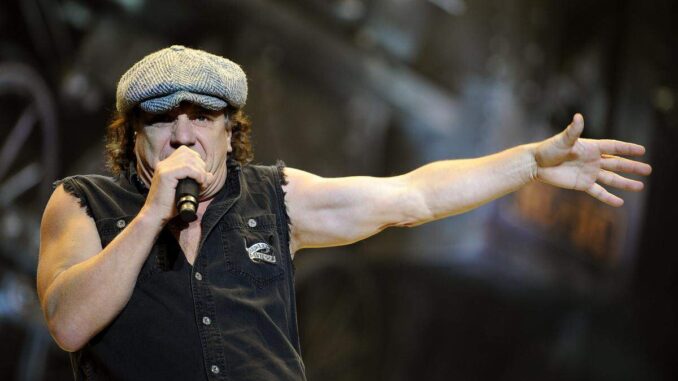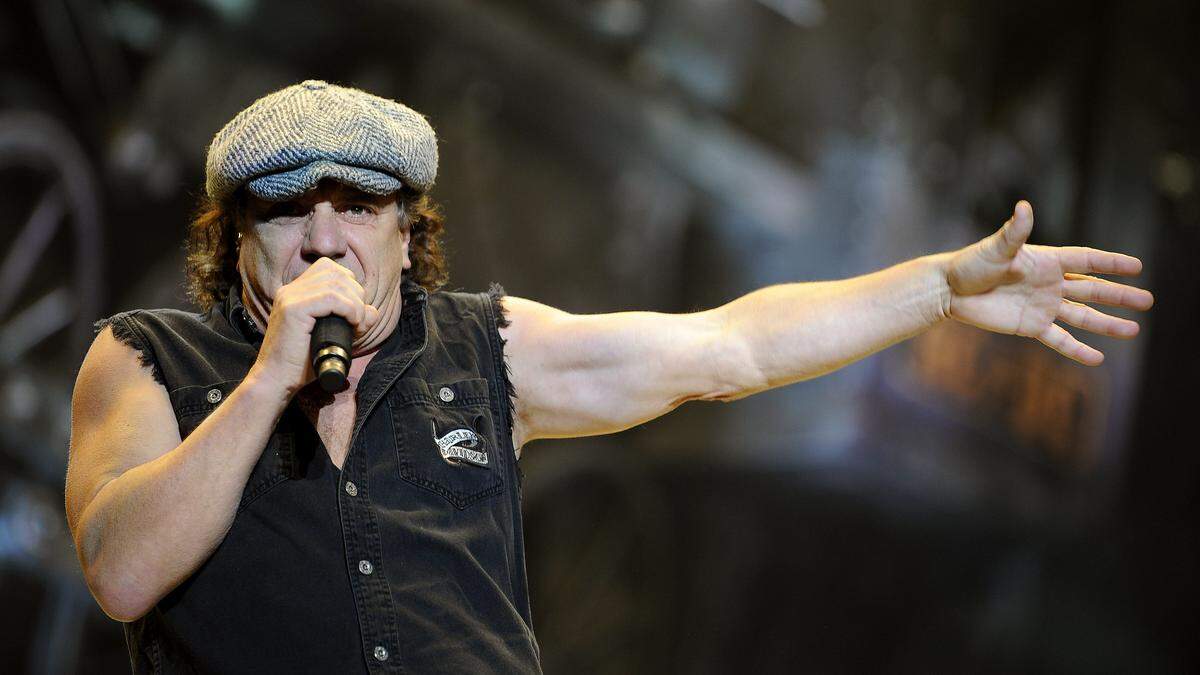
AC/DC’s Brian Johnson picks his favourite Led Zeppelin song
Some people like the simple life, and AC/DC frontman Brian Johnson is one of them. His three main passions are motorcars, football, and rock ‘n’ roll, in no particular order. He is not your average rocker in that he eschews the spotlight for the relaxing clime of Sarasota, Florida. Just like the band he fronts, he occupies a specific space away from traditional genre bombast.

A humble Geordie with a distinctive voice, Johnson joined AC/DC in 1980 after the original frontman Bon Scott’s death and didn’t mess around. His elemental wail augmented the defiant sonics of their first record together, Back in Black, which confirmed to the band and their fans that there was to be a long road ahead, with untold riches on offer. It remains one of the best-selling records of all time.
AC/DC would go from strength to strength and still had an array of hits in their locker, with the flat cap-donning frontman dispelling any initial misgivings about replacing the late Scott, a performer of legendary status. Yet, despite all the band’s success, he, like the rest of AC/DC, has never been one for getting embroiled in controversy or traditional rockstar behaviour. He has kept himself to himself, mostly appearing in the media outside the group to discuss his love of cars or Newcastle United.
In many ways, Johnson was the perfect man to take Scott’s mantle. When the rest of the world was obsessed with rock stars and their outlandish, supposedly God-like stature, AC/DC was always fully committed to what counted most: the music.
They were there to provide a hard-rockin’ good time for fans and take the genre back to its high-energy roots in the vein of the 1950s pioneers such as Chuck Berry. This put them at spiritual odds with the other most prominent groups of the era, such as Led Zeppelin and The Rolling Stones. Guitarist Angus Young even said he thought they had come to represent the very worst of guitar music in the 1970s and were barely making rock ‘n’ roll.

Famously, Young once described Zeppelin as boring live and questioned their status as “the most excitin’ rock ’n’ roll band in the world.” He called them “poor imitators of The Who and bands like that”.
Despite the AC/DC guitarist questioning Zeppelin’s status and connection to rock ‘n’ roll, Johnson has clarified that he is a fan of Robert Plant and Jimmy Page’s band. When appearing on BBC Radio 2’s Tracks of My Years in 2022, he discussed the significance of Zeppelin and chose his favourite song by them. Aptly, it was ‘Rock and Roll’ from 1971’s Led Zeppelin IV.
He also explained that at their peak in the early 1970s, many vocalists were imitating Rod Stewart and David Bowie’s vocals and were getting all the gigs. Johnson, who was playing in previous band Geordie back then, said people only wanted covers during this era, and not originals, and the closest he could get to imitating another was Bob Seger, meaning he struggled to be heard. However, when Zeppelin broke out, he knew he was on the money. It wasn’t ‘Rock and Roll’ that made him realise this, but another Led Zeppelin IV track, ‘Black Dog’.
Johnson recalled: “It was hard and I was going, ‘What the hell can I sing?’. Then even though it was ‘Black Dog’ the first one I heard, I remember the guy started rehearsing and I could sing up there. I couldn’t believe it and I went ‘I can do this! This is great’. So we started doing it”.
Whether Angus Young likes it or not, Brian Johnson, the AC/DC vocalist, might not have come to fruition without Led Zeppelin and Robert Plant. His wail makes a lot more sense after hearing such an account.
The end is nigh. Maybe. If you’ve been paying attention, the end has been nigh for over 100 years. However, in the grand scheme of music, 100 years isn’t very long at all. The ongoing loom of the apocalypse has been an inspiration for music throughout this period, and as the four horsemen continue to saddle up, listeners ponder over upcoming destruction with a song in their hearts.
The approach to making music that signifies destruction is interesting, as the composer’s mind can make a song change from being resentful about dying to happy about living. Take, for instance, ‘Nuclear War’ by Sun Ra, one of the most chaotic and looming instances of the end of the world ever committed to sound. This takes the fear that encroaches upon everyone at the prospect of nuclear destruction and perfectly puts it to music.
Contrast that with a track like Prince’s ‘1999’, and you have a song that warns of upcoming destruction but also tells the listener not to worry about it. While Prince thought the world would end at the turn of the millennia, he also knew that he could do nothing about it. As such, rather than dwell on death in 2000, he instead opted to party like it was ‘1999’.
Two of the most famous songs about the apocalypse take a similar approach to Prince as opposed to Sun Ra. ‘It’s The End of the World As We Know It’ and ‘We Didn’t Start the Fire’ are two of the most popular and recognisable songs about the apocalypse, linked both in their themes and the joyful way they’re presented. It almost feels like rebellion, taking a stand against the end of the world by acknowledging it so gleefully.
The two songs have a lot in common but also details that set them apart. They both overload the listener with information, which almost feels as though it contributes to the upbeat and fun nature of the instrumentation. The bands say, “Here is everything that has led to the end of the world; there was nothing we could do about it, so don’t worry.”
That being said, the lyrics which the artists use are entirely separate from one another, both in their reason for being written and the thought process behind the writer. When played side by side, the listener’s reaction may be quite similar; however, when you dissect the lyrics, the feelings invoked vary massively.
Released in 1987, R.E.M.’s hit song ‘It’s the End of the World As We Know It (And I Feel Fine)’ is one of their biggest. With a beaming dive headfirst into the end of days, the band managed to make a track that has us acknowledge a shared fear gloriously. The most notable part of the song is the catchy chorus, which proclaims repeatedly, “It’s the end of the world as we know it.” However, the lyrics in the verse give this song a definitive tone in that nothing connects them.
When asked about the lyrics, Michael Stipe said, “The words come from everywhere. I’m extremely aware of everything around me, whether I am in a sleeping state, awake, dream-state or just in a day-to-day life.”
He provided an example, “There’s a part in ‘It’s The End Of The World As We Know It’ that came from a dream where I was at Lester Bangs birthday party and I was the only person there whose initials weren’t L.B. So there was Lenny Bruce, Leonid Brezhnev, Leonard Bernstein…sSo that ended up in the song along with a lot of stuff I’d seen when I was flipping TV channels.” He concluded by saying the lyrics were a “collection of streams of consciousness”.
This differs from Billy Joel’s offering, who writes with serious intent on his 1989 track ‘We Didn’t Start The Fire’. The lyrics here, just as jam-packed as R.E.M.’s outing, talk about specific moments in time that Billy Joel believed were passed to his generation by the last. This inheritance of doom formed the foundation for the entire track. “I started with Harry Truman because in 1949, the year I was born, Harry Truman was president,” said Joel, “From there, it kind of wrote itself”.
This distinction between the lyrics, as one song is born from randomness and the other from problems inherited by a generation that didn’t ask for them, means that two contrasting attitudes come to the same conclusion. R.E.M. says, “There was nothing anybody could do,” while Billy Joel says, “Someone could have done something, but they didn’t.”
Either way, the result is the same, as both songs shrug off the apocalypse as inevitable and welcome it with a song as upbeat and fun as it is hopeless.

Leave a Reply